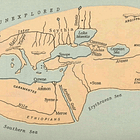The Richest Human Of All Time
The amazing story of Mansa Musa the ruler of the Mali Empire
We live in a world where material wealth is the benchmark by which many live and breathe. We have the poorest of the poor following the rich on social media, ironically enriching them further with every like and comment by way of influence.
In this paradigm we have some that have risen to the top of the pile in terms of wealth. Of course we know there are those of immense wealth that we’d never see on Forbes, but of those that are in the light, there are names we hear often.
Elon Musk, Jeff Bezos, Bill Gates and so forth. However there is a name most people have never heard. An African King whose wealth dwarfs that of any human that has ever lived on earth. His name is Mansa Musa and this is his story.
A Rise To Power
In the early 14th century, in West Africa, there were powerful kingdoms with rich cultures and vast lands and in the kingdom of Mali, one man's journey to power began.
Mansa Musa was born into royalty and when he became king in 1312, he had a big challenge: ruling over a vast kingdom in West Africa.
He inherited a land with lots of gold and fertile fields, but he knew that keeping wealth needed careful management. So, like a shepherd looking after his flock, Mansa Musa ruled with wisdom as opposed to brute force, something common in that era and arguably to this very day.
The Kingdom's Secret Wealth
While other kingdoms gained glory through wars, Mali had a hidden treasure. It’s true strength—gold. Mali had the most gold in Africa and mines in Boure and Bambuk made Mansa Musa wealthy beyond comprehension.
However, as I stated, Mansa Musa was a wise king and didn’t rely on a single source of income. He improved farming with smart irrigation, turning barren lands into fields for crops like millet, rice, and cotton. By doing this, he protected his people from drought and famine that swept other lands and kingdoms around Mali.
Mansa Musa also invited scholars to Timbuktu, turning it into a center of learning and culture in the process. With all these achievements, his biggest adventure was still to come—a journey that would make history and become one of legend.
The Golden Pilgrimage Of An African King
In 1324, Mansa Musa's most famous moment arrived. He went on a religious journey to Mecca with the most immense procession ever seen. Imagine scores of people carrying gold bars, wearing silk clothes, and holding golden staffs. Mansa Musa gave away so much gold on this journey that it caused economic problems in Cairo, Medina, and Mecca. Every where he passed through, he crashed the economy all by himself.
A Legacy Of Gold
After returning to Mali, Mansa Musa brought back experts to develop the kingdom. The beautiful Sankore Madrasah in Timbuktu stands as a sign of his support for education and architecture.
His impressive pilgrimage made Europe notice Mali, and it was added to world maps. Mansa Musa's rule made Mali famous and set the stage for a strong empire.
In history, Mansa Musa's wealth is unmatched. Some say his wealth was between 400-500 billion dollars but that is a gross underestimation. This man had control of most of the known world’s gold. A time before crude oil and other minerals as global commodities. Gold was the oil of that time so imagine one man controlling most of the oil in today’s world. Mansa Musa was likely a trillionaire.
Mansa Musa shouldn’t just be remembered as the richest man of all time but as a leader who valued knowledge, supported culture, and strengthened his kingdom in many ways. His time is a shining period in Africa's history, showing its potential to rise, thrive, and inspire the world.
We continue the CLEOPATRA: BLACK OR WHITE series for premium members next week.








This story about king Mansa Musa is quite intriguing. What’s even more impressive is, his influence on culture, education, art and the architectural ambiance to facilitate and cultivate the imagination. Therefore, creating an empire that marvel’s modern civilization! Awesome work. Thank you!
It is so great to know that the richest man ever lived was an African.
I also recently knew about this as it is not talked about. Thanks for this!